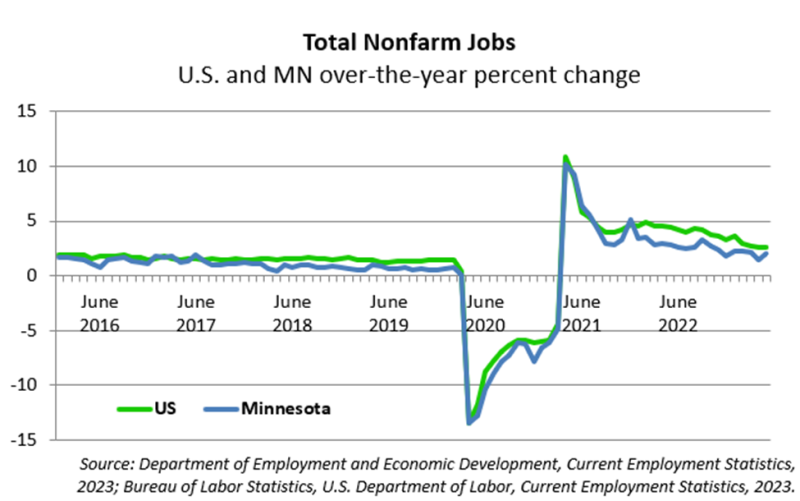By Nick Dobbins
July 2023
The Minneapolis-St. Paul-Bloomington MSA added 10,581 jobs (0.5%) over the month in June. Mining, Logging, and Construction had the largest real and proportional growth of any supersector in the area, adding 4,811 jobs or 5.3%. Financial Activities employment was up 1,685 (1.2%), and Other Services was up 1.3% or 960 jobs. All told, eight of 10 published supersectors posted positive monthly growth. The only exceptions were Professional and Business Services, which lost 1,291 jobs (0.4%), and Trade, Transportation and Utilities, which lost 142 jobs (0%). Retail Trade added 1,161 jobs (0.6%), and Wholesale Trade added 155 (0.2%), but Transportation, Warehousing, and Utilities lost 1,458 jobs (1.8%).
Over the year the metro area added 45,105 jobs or 2.3%. Eight of 10 supersectors added jobs, with the declines coming in Financial Activities (down 2,511 jobs or 1.7%), and Information (down 97 jobs or 0.3%). Leisure and Hospitality posted the largest proportional annual growth, up 6.8% or 12,543 jobs. The largest real job growth came in Educational and Health Services, which added 17,403 jobs or 5.2%. Government employers added 9,246 jobs or 3.8%, with employers at the Local Government level adding 7,634 jobs or 4.8%.
The Duluth-Superior MSA added 1,556 jobs or 1.3% in June. It was the highest proportional monthly growth of any MSA in Minnesota. Mining, Logging, and Construction added 534 jobs (5.4%), the largest proportional growth of any supersector. Government employers added 599 jobs (2.4%), with State Government employers up 353 or 4.8%. Two supersectors lost jobs on the month. Educational and Health Services was down 145 (0.5%), and Professional and Business Services was down 56 (0.7%).
Over the yea, Duluth employers added 3,263 jobs (2.5%). Six of 10 published supersectors added jobs, with the highest real and proportional growth coming in Educational and Health Services (up 1,618 or 5.4%). Trade, Transportation, and Utilities added 857 jobs (3.6%), led by the addition of 829 jobs (5.8%) in Retail Trade. The largest job loss came in Mining, Logging, and Construction, which was off by 336 or 3.1%. The other supersectors to post negative growth were Leisure and Hospitality, Financial Activities, and Professional and Business Services.
The Rochester MSA added 1,333 jobs (1.1%) over the month of June, with nine of 10 published supersectors adding jobs. Mining, Logging, and Construction was up 294 (5.6%). Government employers added 457 jobs (3.5%), with most of that growth coming at the local level (up 405 or 3.8%). The only supersector to lose jobs on the month was Professional and Business Services, which was off by 47 or 0.7%.
Over the year Rochester employers added 3,652 jobs (3%). Educational and Health Services was up by 1,974 jobs (3.7%), the largest real job growth of any supersector. The largest proportional growth was in Other Services, up 5.8% (211 jobs). Trade, Transportation, and Utilities employment was up 761 (4.5%) thanks to the addition of 914 jobs (7.6%) in Retail Trade. The sharpest declines came in Professional and Business Services, which was off by 169 or 2.5%.
The St. Cloud MSA lost 443 jobs (0.4%) in June. It was the only MSA primarily in Minnesota with negative job growth in June, although both North Dakota-based MSAs lost jobs as well. Government employers lost 902 jobs (6%) with losses at the state and local levels, driving the overall declines. Educational and Health Services lost 221 jobs or 1%. The largest employment growth came in Mining, Logging, and Construction, which added 371 jobs or 4.7%. Trade, Transportation, and Utilities added 218 jobs (1%), with growth in all three component sectors.
Over the year the St. Cloud MSA added 2,407 jobs or 2.3%. Educational and Health Services posted the largest real and proportional growth by a large margin, adding 1,861 jobs or 9.4%. Trade, Transportation, and Utilities added 633 jobs (3%), and Manufacturing added 411 jobs (2.7%). The steepest declines came in Professional and Business Services, which was off by 594 jobs or 7.5%.
The Mankato-North Mankato MSA added 70 jobs (0.1%) over the month in June. The growth came entirely from public sector employers, which added 85 jobs (0.8%), while private sector employers lost 15 jobs (0%). Goods producers added 399 jobs (3.7%), and service providers lost 329 (0.7%).
Over the year employment in the Mankato-North Mankato MSA was up 6.5% or 3,576 jobs. This was the highest proportional over-the-year growth of any MSA in Minnesota and included growth in all published series. Goods producers added 716 jobs (6.9%), and services providers added 2,860 (6.4%). Government employment was up 7% (677 jobs), and private sector employment was up 6.4% (2,899 jobs).
Employers in the Fargo-Moorhead MSA lost 493 jobs (0.3%) in June. Drops in Government employment drove the decline, as public sector employers shed 1,529 jobs (7.6%). State level employers lost 851 jobs (14.5%), and Local employers lost 694 (6%). The largest real and proportional increases came in Mining, Logging, and Construction, where employment was up by 637 (6.7%).
On an annual basis the Fargo-Moorhead MSA added 1,968 jobs or 1.3%. This was the lowest proportional annual growth of any MSA in Minnesota. Educational and Health Services was up 1,873 (6.9%), the largest real and proportional growth of any supersector. Leisure and Hospitality was up 557 (3.9%). Government employers shed 499 jobs (2.6%). Information employment was off by 209 or 7.3%.
The Grand Forks-East Grand Forks MSA lost 222 jobs (0.4%) over the month in June. Government employers lost 470 jobs (3.6%). The largest growth came in Mining, Logging, and Construction, which added 200 jobs or 6.6%.
Over the year the Grand Forks-East Grand Forks MSA added 1,310 jobs or 2.5%. Nine of 10 published supersectors added jobs on the year, with the lone negative growth coming in Mining, Logging, and Construction (off by 131 or 3.9%). Trade, Transportation, and Utilities added 312 jobs (3%), thanks in large part to the addition of 303 jobs (4.7%) in Retail Trade. Other Services employment was up by 6.4% (112 jobs), and Government employers added 208 jobs (1.7%).
